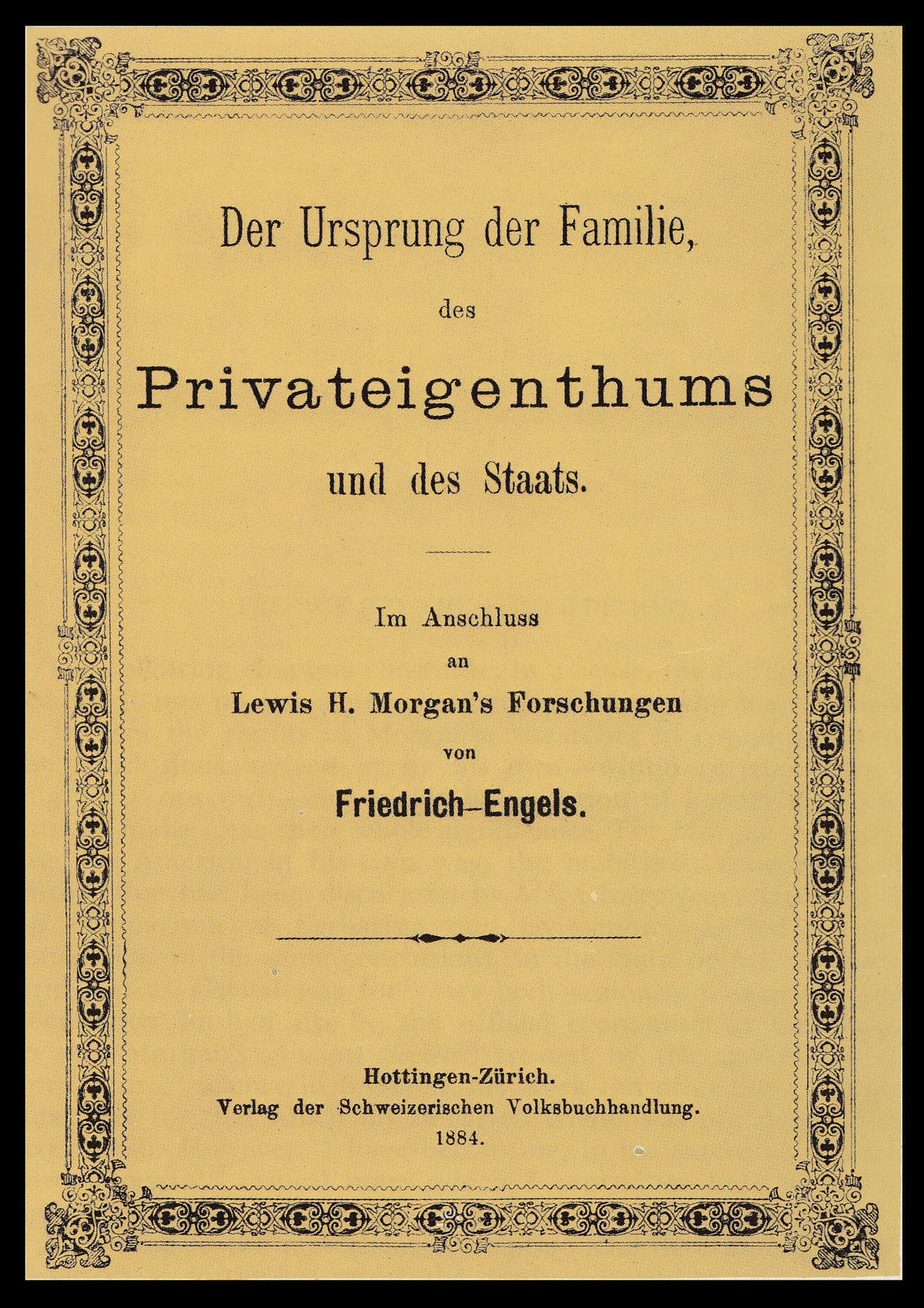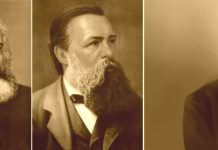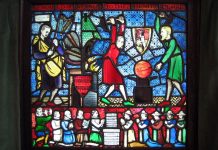Linkbox med materiale om Friedrich Engels’ marxistiske klassiker “Familiens, Privatejendommens og Statens Oprindelse”, udgivet 3. oktober 1884.
Oktober 2009
3. oktober 1884
Friedrich Engels udgiver Der Ursprung der Familie, des Privateigentums und des Staats. Im Anschluss an Lewis H. Morgan’s Forschungen.
Dansk udgave: Familjens, Privatejendommens og Statens Oprindelse. I Tilslutning til Lewis H. Morgans Undersøgelse. Udgivet af Det Danske Socialdemokrati (Socialistisk Bibliotek, Bd. 7, 1888, 123 sider, 40 øre)
Efter at Friedrich Engels i marts-juni 1884 havde skrevet teksten, blev den udgivet samlet i Hottingen-Zürich i Svejts.
Se bogen online
- På dansk: Familiens, privatejendommens og statens oprindelse (Marxisme Online)
- På engelsk: The Origin of the Family, Private Property and the State (Marxists Internet Archive)
Artikler om bogen mv.
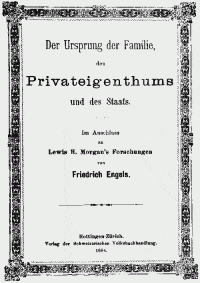
- The Origin of the Family, Private Property and the State (Wikipedia.org)
Engels om kvindeundertrykkelsens oprindelse. Af Marie Frederiksen (Revolution, 17. september 2021). Kapitel i M.F.’s Marxisme & feminisme (Forlaget Marx, 2020, s.19-24). Scroll ned.
“… denne korte gennemgang af Engels’ Familiens, privatejendommens og statens oprindelse er … nødvendig at have på plads inden polemikken mod de feministiske teorier.”
Engels og kvinneundertrykkingas opprinnelse. Av Sharon Smith (Internasjonal Sosialisme, nr.3, våren 1999)
“I denne artikkelen undersøker den amerikanske sosialisten Sharon Smith Engels’ teori, og konkluderer med at hans ideer fremdeles er det beste utgangspunktet for å forstå kilden til kvinneundertrykkinga, og hvordan den kan bekjempes.”
Primitive Communism is not what it used to be: at the origin of male domination. By Erwan Moysan (Marx & Philosophy Review of Book, 30 September 2024). Review of Christophe Darmangeat’s book (Brill, 2024, 336 p.)
“Engels, basing himself on Lewis H. Morgan’s research on the Iroquois, believed classless societies, if not matriarchal, had egalitarian gender relations. Economist and anthropologist Christophe Darmangeat establishes with overwhelming evidence that, in fact, male domination is the norm in classless societies.”
Engels for our times: gender, social reproduction, and revolution. By Marnie Holborow (Monthly Review, Vol.75, No.10, March 2024)
“… Holborow examines his influential work, The Origin of the Family, Private Property and the State, finding his observations on gender roles and social reproduction under capitalism—and their expressions based on class—are not only astute for Engels’s time, but very much for ours as well.”
Revisiting Engels: history, gender & class. By Marnie Holborow (Irish Marxist Review, Vol.10, No.30, 2021)
“The importance of the book [The Origin of the Family, Private Property and the State] is that it marked the first Marxist attempt to bring together history, gender, and class. Engels provided a historical materialist explanation of women’s oppression whose political conclusion was that capitalism was a gendered and exploitative system, and that tackling oppression meant taking on capitalism.”
The Feminist vision of Friedrich Engels. By Jennifer Doyle (Jacobin, September 16, 2021)
“In his book The Origins of the Family, Private Property and the State, Friedrich Engels linked the ‘world-historical defeat of the female sex’ to the rise of class exploitation. Engels helped lay the foundations for a Marxist understanding of women’s oppression.”
Engels on women, the family, class and gender. By Sheila McGregor (Human Geography, Vol.14, No.2, 2021; online på Academia.edu)
“This article looks at Engels’s writings to show that his ideas about the role of labour in the evolution of human beings in a dialectical relationship between human beings and nature is a crucial starting point for understanding human society and is correct in its essentials.”
Engels was a Bro! By Andrea Peniche (Transform! Europe, 23 December 2020)
“A tribute to Friedrich Engels’ ‘The Origin of the Family, Private Property and the State’ and the groundwork for feminism by the jubilarian.”
The origins of women’s oppression – a defence of Engels and a new departure. By Sandra Bloodworth (Marxist Left Review, No.16, Summer 2018)
“… the most recent archaeological evidence, while it radically challenges Engels’ historical detail, actually strengthens his central thesis that women’s oppression was established as society divided into classes.”
Engels, Neanderthals and the origins of the family. By Mike Beaken (International Socialism, Issue 154, Spring 2017, p.151-167)
“In sum, it may be that we have in this period of our prehistory a confirmation of at least one aspect of Engels’s theories, based on concrete evidence from genetics and archaeology, and that his theories, proposed well over a hundred years ago, are still relevant to current disputes about the origins of the human family.” See also Feedback from Pete Wearden: Why did our ancestors succeed? (Ibid., Issue 155, Summer 2017, p.207-211)
Engels and women’s liberation (Socialism Today, Issue 181, September 2014)
“It is 130 years since the publication of The Origin of the Family, Private Property and the State, by Friedrich Engels … Christine Thomas weighs up the book’s relevance for women’s struggles today.”
Anthropology: Engels was right. By Lionel Sims (Weekly Worker, Issue 977, September 12, 2013)
“Over the last 50 years there has been a revolution in all of these disciplines and the rise of entirely new sciences, in particular molecular biology and behavioural ecology. All of them have overturned the traditional bourgeois theory of prehistory and all of them lend support to Engels’ original claims.”
See also: Anthropology and women: Genetic evidence is richer than the stale party line. By Chris Knight (Weekly Worker, Issue 970, July 11, 2013)
Origin of the family: in defence of Engels and Morgan. By Rob Sewell (In Defence of Marxism, 21 December 2012)
“The revolutionary ideas contained in [Lewis Henry Morgan’s Ancient Society] represented a complete departure in this field of human development and served to found a materialist, evolutionary school of anthropology. It was on the basis of this work that Frederick Engels wrote his masterpiece, The Origin of the Family, Private Property and the State.
Supplement: Early human kinship was matrilineal. By Chris Knight (Weekly Worker, Issue 930, September 20, 2012)
“In my talk and eventually published chapter, I argued quite bluntly that Engels was essentially right: we now have compelling evidence that early human kinship was indeed matrilineal.”
On Engels’ ‘Origin of the Family’, Part 1 (In Defence of Marxism, 7 March 2012) + Part 2 (26 March 2012)
“One of the great classics of Marxism is the book by Frederick Engels … Engels applies the method of historical materialism to this earliest period of pre-history to uncover the past. As a contribution to International Women’s Day, we are republishing in two parts an article by Mary Hansen and Rob Sewell which examines this question.”
Primitive communism, barbarism and the origins of class society (Weekly Worker, Issue 900, February 9, 2012)
“Lionel Sims identifies both errors and the profound truths discovered by Engels in his ‘Origins’.”
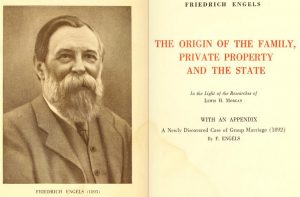
Origin of the Family, Private Property and the State. By Elizabeth Schulte (Socialist Worker, US, Issue 671, May 12, 2008)
“Elizabeth Schulte explains how Frederick Engels’ classic book identifies the source of women’s oppression in the development of class society.”
The origins of women’s oppression. By Rob Sewell (In Defence of Marxism, 5 September 2001)
“While middle class feminists regard the oppression of women as an inherent biological trait of men, Marxism explains that the root of women’s oppression lies not in biology, but in social conditions.”
Engels and the origin of women’s oppression. By Sharon Smith (International Socialist Review, Issue 2, Fall 1997, p.38-47)
“Sharon Smith looks at Engels’ theory and argue that his ideas remain the best starting point for understanding the source of women’s oppression and how to end it.”
Se norsk udgave: Engels og kvinneundertrykkingas opprinnelse (Internasjonal Sosialisme, nr.3, våren 1999)
Engels and the origins of human society. By Chris Harman (International Socialism, Issue 65, Winter 1994, p.83-142; online at Marxists Internet Archive)
“Scientific advance over the last century has, of course, dated some of Engels material … Yet his writings still retain enormous relevance. He applies a method which is materialist without being mechanical – and which continues to challenge both idealism and the terrible twins of behaviourism and sociobiology.”
Engels and human development. By John Pickard (In Defence of Marxism, June 1984)
“John Pickard which reviews Engels contribution to the understanding of human development and specifically his pamphlet The Part Played by Labour in the Transition from Ape to Man.”
The Origins of the Family: 100 years on. By Chris Harman (Socialist Worker Review, No.68, September 1984, p.15-20)
“A look at Engels’ classic work on the family, and its critics.”
Se også:
Unravelling human history: the rise of class society and women’s oppression. By Sheila McGregor (International Socialism, Issue 181, Winter 2024, p.137-148). Review of Nancy Lindisfarne and Jonathan Neale, Why Men? A Human History of Violence and Inequality (Oxford University Press, 2023)
“Nancy Lindisfarne and Jonathan Neale’s new book is shaped by just such a ‘feminist sociobiology’ and a rejection of Morgan and Engels, even though it tries to retain a focus on the importance of class.”
From egalitarian society to colonialism: understanding the history of women’s oppression. By Sheila McGregor (International Socialism, Issue 179, Summer 2023, p.169-178). Review of Angela Saini, The Patriarchs: How Men Came to Rule (Harper Collins, 2023, 320 p.)
“There is much of interest in The Patriarchs, but it fails to answer the question of ‘how men came to rule’. Nor does it answer the question of how women can be liberated.”
The fall of woman: property, oppression and the family. By Fred Weston (In Defence of Marxism, Issue 41, Spring 2023, p.6-17)
“The pioneering anthropologist Lewis Henry Morgan put forward the revolutionary idea that women’s oppression are to be found in the rise of private property and the monogamous ‘nuclear’ family.”
The origins of classe society (In Defense of Marxism, 6 May 2022)
“As Josh Holroyd and Laurie O’Connel explain in this article first published in the IMT’s theoretical journal, In Defence of Marxism [Issue 35, Winter 2021, p.5-19], modern archaeology has produced a plethora of evidence attesting to the fact that the division of society into classes is a relatively recent development in human history.”
Women’s work in the first civilisations. By Rosemarie Nünning (International Socialism, Issue 172, Autumn 2021, p.149-160)
“This article aims to show the diversity of women’s work in ancient Mesopotamia, an early civilisation about which we have written evidence.”
Marx on Gender and the Family: A Summary. By Heather Brown (Monthly Review, Vol.66, No.2, June 2014). This article is adapted from the conclusion of her book Marx on Gender and the Family: A Critical Study (Haymarket/Brill, 2013/2012, 246 p.). The book online (pdf) at Online University of the Left.
See review by Jenny Morrison (International Socialist Group, 13 December 2012; online at Internet Archive) + review by Lindsey German (Counterfire, 12 July 2013) + review by Jessie Muldoon (International Socialist Review, Issue 93, Summer 2014).
On the origins of women’s oppression. By Pat Brewer (Links: International Journal of Socialist Renewal, Issue 14, 2000)
“The evidence Brewer presents supports the claim that women’s oppression has not always existed and that it.”
See review by Kamala Emanuel: The new evidence on women’s oppression (Green Left Weekly, Issue 396, 8 March 2000)
See also Sue Bull: Patriarchy and the origins of women’s oppression (Links: International Journal of Socialist Renewal, 16 July 2023)
Se også på Socialistisk Bibliotek:
- Emneindex Marxisme / Marxism
- Emneindex Kultur / Culture
- Tidslinjen 28. november 1820 om Friedrich Engels
















